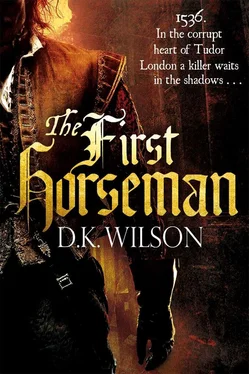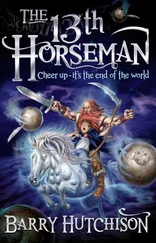D. Wilson - The First Horseman
Здесь есть возможность читать онлайн «D. Wilson - The First Horseman» весь текст электронной книги совершенно бесплатно (целиком полную версию без сокращений). В некоторых случаях можно слушать аудио, скачать через торрент в формате fb2 и присутствует краткое содержание. Год выпуска: 2013, ISBN: 2013, Издательство: Little, Brown Book Group, Жанр: Исторический детектив, на английском языке. Описание произведения, (предисловие) а так же отзывы посетителей доступны на портале библиотеки ЛибКат.
- Название:The First Horseman
- Автор:
- Издательство:Little, Brown Book Group
- Жанр:
- Год:2013
- ISBN:9781405518871
- Рейтинг книги:5 / 5. Голосов: 1
-
Избранное:Добавить в избранное
- Отзывы:
-
Ваша оценка:
- 100
- 1
- 2
- 3
- 4
- 5
The First Horseman: краткое содержание, описание и аннотация
Предлагаем к чтению аннотацию, описание, краткое содержание или предисловие (зависит от того, что написал сам автор книги «The First Horseman»). Если вы не нашли необходимую информацию о книге — напишите в комментариях, мы постараемся отыскать её.
The First Horseman — читать онлайн бесплатно полную книгу (весь текст) целиком
Ниже представлен текст книги, разбитый по страницам. Система сохранения места последней прочитанной страницы, позволяет с удобством читать онлайн бесплатно книгу «The First Horseman», без необходимости каждый раз заново искать на чём Вы остановились. Поставьте закладку, и сможете в любой момент перейти на страницу, на которой закончили чтение.
Интервал:
Закладка:
All these reflections met, inevitably, in one question: who ordered the murder of Robert Packington? It had always seemed obvious that the culprit must be found among the ranks of the clergy opposed to everything he stood for; men who hated the thought of an open Bible; men who loathed Tyndale with a passion and rejoiced at the news of his burning; men who thought that the translator’s death was the signal for a major operation against those covert Lutherans, the New Learners who were disturbing the realm. And yet… I took out Doggett’s note and stared at its simple message as though I thought that, somehow, it might have changed since I had thrust it inside my doublet. The four words were, of course, still there:
‘Lord Cromwell ordered it’.
They still screamed their utter impossibility. But the writer had no reason to make such an extraordinary identification of the wretch who had masterminded my friend’s death. He would know that I would refuse to believe it. Then, with the brilliance of sunlight bursting forth from clouds, I realised that that might very well be the point. No one would connect Cromwell’s name with the murder of a man so closely committed to his own cause. They would assume, as I had done, that Robert had been killed on the orders of traditionalist clergy who were dedicated enemies of the New Learning. However, what fresh understanding might emerge if one allowed oneself to think the unthinkable?
One answer was that it provided answers to some awkward questions my mind had shuffled aside: how had Incent made contact with a professional Italian killer? How was he aware of Robert’s movements? What exactly was it that had troubled Robert so much on his visits to the Netherlands? Cromwell had himself been a mercenary soldier in the Italian wars. He would know of men skilled enough and desperate enough to kill for pay. He could easily have brought Il Ombra over and lodged him at the Red Lamb, available to do his bidding. That would explain why Doggett had been so determined to throw me off the scent when I visited him. Cromwell was the only other person who could have known where Robert would be on that misty November morning, because Robert’s first action on his return the previous day would have been to report to his patron. Time enough, then, for Cromwell to get an urgent message to his assassin-in-waiting.
But why? What possible motive could Cromwell have had for wanting his friend and colleague out of the way? This surely was the rock on which such a theory must founder. I stared across the water at the abbey and palace complex where, even now, Cromwell was probably presiding over his Grand Council. Abbot Donne was among the delegates. What was it he had said about the mission to the Netherlands? Robert had been in a profound melancholy because he had failed. Failed to save Tyndale from the flames? No, failed to save Tyndale from his own conscience. The scholar had refused to abandon his opposition to the king’s divorce. Persuading him, then, must have been the aim of Robert’s mission. Without such a change of mind the prisoner was doomed. The king hated him. Cromwell could not save him and would not have dared to try. Moreover, as long as Tyndale lived, the minister would not have been able to champion his translation. With Tyndale out of the way, however, Henry could announce to the Catholic world that he had disposed of a stubborn heretic. And Cromwell could throw himself wholeheartedly into promoting an English Bible that was substantially Tyndale’s work. According to Donne, that was precisely what he was now doing. Either the translator or the translation could survive — not both. In view of Tyndale’s obduracy, Cromwell could only withdraw his protection. Did he indicate to the imperial authorities that they could proceed with their prosecution of Tyndale without any official protest from England? Or did he simply let events take their course? Either way, Robert would have realised that Cromwell was nailing Tyndale to the cross of New Learning politics. That knowledge would have devastated Robert beyond measure. No wonder his Antwerp friends had described him as being broken by his complicity in such betrayal. Would he have been able to keep the bitter knowledge to himself? That might be a risk Cromwell could not afford to take.
He was a man with a vision. That had become obvious to me from our meetings. He was set on creating a new England with a new learning and a new Bible. His problem was that he was like a coachman trying to handle two ill-paired horses. The king was a plodding reformer, always sensitive about being dubbed a heretic. But several of the minister’s allies were eager stallions, impatient for change. He needed the support of his royal master and of the ‘New Learners’. I recalled Poyntz telling me how he and others had been locked up on Cromwell’s orders to calm the overheated atmosphere following Barnes’ sermon at Robert’s funeral. If the minister feared that Robert might reveal Tyndale’s ‘betrayal’ to his friends, then the loss of their support would have been a serious blow.
This very morning Incent had crowed about divisions in the visionary’s own camp and reminded me how Cromwell had turned against Queen Anne. I closed my eyes against the glare of the lowering sun reflected from the water. And I saw once more that lady in grey, as it seemed, willing the silent crowd to know that she was innocent. She had perished because she had aroused the anger of her royal husband. He had wanted her dead and Cromwell, if he was to survive, had been obliged to make the necessary arrangements. He had survived. He lived still to achieve the goal he had set himself. He would justify any action that became necessary in the process. Exitus acta probat .
I tore the paper across and dropped the pieces into the water. For a moment or two they floated, then, as they dwindled into the depths, a shard of dirty ice drifted over them and they disappeared. I shivered. The cold was penetrating my clothes. I rose stiffly and stretched my arms. As I turned, a strange sight confronted me. Dickon was still contentedly nibbling the meadow grass. The winter-evening sun shone full on him, so that he seemed to glow with an almost supernatural whiteness against the background of the dense, grey-black trees. I went over and patted his neck. Gathering the reins, I hoisted myself into the saddle. Then I turned his head towards London and the future.
Интервал:
Закладка:
Похожие книги на «The First Horseman»
Представляем Вашему вниманию похожие книги на «The First Horseman» списком для выбора. Мы отобрали схожую по названию и смыслу литературу в надежде предоставить читателям больше вариантов отыскать новые, интересные, ещё непрочитанные произведения.
Обсуждение, отзывы о книге «The First Horseman» и просто собственные мнения читателей. Оставьте ваши комментарии, напишите, что Вы думаете о произведении, его смысле или главных героях. Укажите что конкретно понравилось, а что нет, и почему Вы так считаете.












